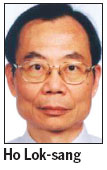Flaws of tenants purchase
Updated: 2013-05-14 13:57
By Ho Lok-sang(HK Edition)
|
|||||||

Professor Richard Wong of the University of Hong Kong has been an ardent advocate of the privatization of public housing for a long time. I have no disagreement with this in principle, but I am against an unconditional giving away of public resources to private individuals. Public resources should be spent for a worthy public purpose, and the disposal of public resources must not be seen as arbitrary or unfair. Public-housing tenants who have benefited from low rent for years are definitely not the most deserving group to benefit from any give-away plans.
As a matter of fact, a University of Hong Kong student completed an MPhil dissertation years ago. I happened to be the external examiner. The student, already graduated, presented data that I have cited in my own published academic papers, showing that public-housing tenants happen to be the group that saved the most - both relative to their incomes and in absolute terms. With such handsome savings, which were made possible by huge implicit rental subsidies, many public-housing tenants became ready to buy private housing.
If this group of households have benefited significantly, and if many of them are ready to move on to private housing, why should taxpayers pile extra benefits on them?
Professor Wong is entirely correct in saying that privatized units can be put to better use, and that public housing units held by undeserving households represent much waste. This is why the Housing Subsidy Policy that requires well-off tenants to pay higher rent and even market rent is entirely justified. Selling public-housing units at deeply discounted prices, on the other hand, represents a reversal of that policy. When there are already long queues of households waiting to be assigned a public-housing unit, we certainly cannot afford to let public-housing units disappear into private hands.
If we want to capture the benefits of privatization without the unfair distribution, we must make sure that buyers are deserving (i.e. they satisfy the income and asset limit requirements to apply for public housing) and that if they are to resell in the future they can only resell to equally deserving buyers. That would mean that the prices will have to be very low, otherwise the units would become unaffordable. But the privatization plan is not really meant to bring financial returns to the Housing Authority, and is meant entirely so the units can be better managed and better utilized by their owners. This way those in the queue who cannot wait do have a way to secure a unit sooner than otherwise.
But this raises other problems. Many owners may find it attractive to rent their units out for a profit. In principle, we could and should require that the unit can only be rented to people certified eligible for public housing. In all likelihood the rents that the units fetch will still be much higher than official rents. I think this is not so bad, because this is still efficient, and people in the queue do benefit. But people may still object that the owners are ripping off the tenants because the official rents are much lower.
My biggest worries about Professor Wong's ideas are two. First, the grand give away will certainly attract more applicants for public housing. But can Hong Kong follow Singapore's example, which Professor Wong cited, to build "for-ownership public housing" for 90 percent of Hong Kong's population? Each Singaporean has the right to buy a Housing Development Board unit in his lifetime without regard to income or asset limit. If we cannot do that, then the proposal would translate into longer waiting time for a deserving household to be assigned a flat. My second worry is that "for-ownership public housing" will quickly kill the current "Home Ownership Scheme (HOS)" housing, because the latter is sold at much higher prices. In comparison HOS housing will become immensely unattractive. We have seen this happen before. In 1998, following the announcement of the Tenants Purchase Scheme, the HOS for the first time experienced a massive walk-off by buyers who chose to forfeit their down payments.
I do hope that our legislators will carefully consider all the pros and cons of the proposed privatization plan, if the subject should be tabled for discussion.
The author is director of the Center for Public Policy Studies, at Lingnan University.
(HK Edition 05/14/2013 page1)